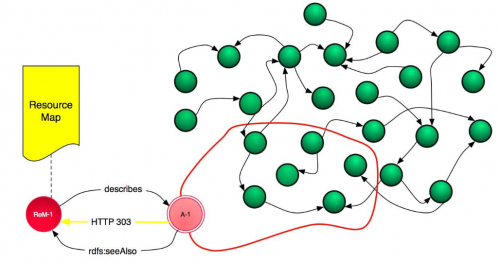Difference between revisions of "OAI-ORE"
Jump to navigation
Jump to search
Kleinfercher (talk | contribs) |
Kleinfercher (talk | contribs) m (→General) |
||
| Line 27: | Line 27: | ||
==Advantages== | ==Advantages== | ||
===General=== | ===General=== | ||
Interoperability, modelling of relations, detection and processing of relation information | |||
===Possible new Features=== | ===Possible new Features=== | ||
===Tools=== | ===Tools=== | ||
Revision as of 10:01, 23 June 2009
Open Archives Initiative - Object Reuse and Exchange
General[edit]
http://www.openarchives.org/ore/logos/ore_logo_e_128.png
OAI-ORE is a standard to describe and identify aggregations on the web. Taking a publication as an example, it mostly consists of multiple resources (publisher pdf, supplementary material, metadata etc.), therefore what we 'see' as an publication is actually the aggregation of multiple resources.
Aggregations should be modelled in respect of the core foundations of the Web
- Resource, an item of interest.
- URI, a global identifier for a Resource.
- Representation
- Link, a directed connection between two Resources.
Basic Principles[edit]
Image from: http://www.slideshare.net/hvdsomp/the-oaiore-interoperability-framework
Aggregation (A)[edit]
A non-informative resource
Resource Map (ReM)[edit]
An information resource that describes an aggregation
Advantages[edit]
General[edit]
Interoperability, modelling of relations, detection and processing of relation information
Possible new Features[edit]
Tools[edit]
- Java Library (for constructing, parsing, manipulating and serializing OAI-ORE Resource Maps. ATOM, RDF/XML, N3, N-Triples, Turtle and RDFa)
- Foreside Explorer
Steps[edit]
Related Material[edit]
- Official oai-ore website
- ore 1.0 Specification
- oai-ore tutorial at OAI6 by Herbert van de Sompel
